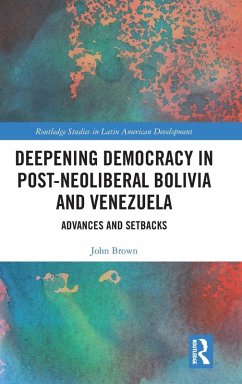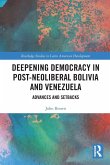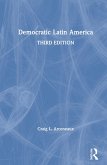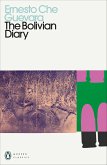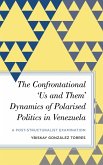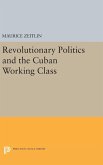This book provides a timely and nuanced analysis of the successes and shortcoming of efforts to move beyond market democracy in Bolivia and Venezuela.
A twin crisis of democratic representation and socio-economic precarity created space for anti-system outsiders to emerge on the left flank of traditional party-systems in Bolivia and Venezuela, paving the way for a "post-neoliberal" democratization process. Over the course of the projects headed by Evo Morales in Bolivia and Hugo Chávez and his successor Nicolás Maduro in Venezuela, however, power struggles emerged between a recalcitrant elite, the left-led government, and organized popular sectors. These tensions shaped the pathways that processes followed, with simultaneous democratization and de-democratization occurring whereby a partial deepening and extending of democratic quality for popular sectors was accompanied by the bending of liberal norms. Comparing the varying balance and forms of power between competing actors, this book offers a novel and rich explanation of the partial and stuttering efforts to advance a post-neoliberal democracy in Bolivia and Venezuela.
Bringing important insights on the reasons for the emergence of anti-system leaders and parties, the impact that they have on the quality of democracy, and how progressive governments interact with social movements, this book will be of interest to researchers studying Latin America, as well as those specializing in development and political science more broadly.
A twin crisis of democratic representation and socio-economic precarity created space for anti-system outsiders to emerge on the left flank of traditional party-systems in Bolivia and Venezuela, paving the way for a "post-neoliberal" democratization process. Over the course of the projects headed by Evo Morales in Bolivia and Hugo Chávez and his successor Nicolás Maduro in Venezuela, however, power struggles emerged between a recalcitrant elite, the left-led government, and organized popular sectors. These tensions shaped the pathways that processes followed, with simultaneous democratization and de-democratization occurring whereby a partial deepening and extending of democratic quality for popular sectors was accompanied by the bending of liberal norms. Comparing the varying balance and forms of power between competing actors, this book offers a novel and rich explanation of the partial and stuttering efforts to advance a post-neoliberal democracy in Bolivia and Venezuela.
Bringing important insights on the reasons for the emergence of anti-system leaders and parties, the impact that they have on the quality of democracy, and how progressive governments interact with social movements, this book will be of interest to researchers studying Latin America, as well as those specializing in development and political science more broadly.
Deepening Democracy in Post-Neoliberal Bolivia and Venezuela is an outstandingly researched, much welcome advance on what it means to "deepen democracy" and the conditions that might help to achieve it, moving us beyond what has become a sterile debate over liberal democracy and radically progressive reformist politics.
Eduardo Silva, Lydian Chair of Political Science, Tulane University, USA
Brilliantly researched, this is a major contribution to academic understanding to the crisis of democracy in Latin America and the tensions between markets, on the one hand, and demands for dignity and citizenship, on the other. A detailed study of anti-system outsider government in Venezuela and Bolivia, it is a valuable contribution to the comparative political economy of the left, and a must-read for anyone interested in contemporary debates about democratisation and populism.
Jean Grugel, Co-Director of Interdisciplinary Global Development Centre (IGDC), University of York, UK
John Brown's debut monograph breaks new ground in the unfolding debate around the relationship between progressive governments and social movements in Latin America with a theoretically informed dense ethnography of Bolivia and Venezuela. It will be indispensable to students of Latin America and of comparative politics more generally. Recommended.
Ronaldo Munck, Dublin City University, Ireland
A most pertinent matter, without any doubt. [...] Strong in this book is the meticulous reconstruction of the adventures of both governments, and the convincing argument that democracy is about more than, for instance, only the abstaining from governing by decree.
Ton Salman, Vrije Universiteit Amsterdam
The key strength of this book is its attention to the messiness of the "process of change" in each country, as well as its attempt to theorize such processes in an innovative way through novel thinking about centralization. As Brown notes, these concepts might be usefully employed to discuss other cases of left-led change.
Gabriel Hetland, Assistant Professor of Latin American, Caribbean, and Latina/o Studies at the University at Albany
Deepening Democracy in Post-Neoliberal Bolivia and Venezuela is a welcome change in the terms of this debate which goes back to the core principles that many scholars-especially from the US-have lost sight of in their circular debates about democratic "consolidation". Author John Brown considers what we mean by democratic quality in Latin America since the transition began in the 1980s, and in so doing injects new vigour into this discussion. This is an outstanding, incisive and original work of scholarship that will enable the reader to reassess, in a largely positive way, what happened in Venezuela and Bolivia-thereby cutting through the blitz of media- and US-led half-truths about recent historical events.
Gavin O'Toole, Queen Mary University of London
Eduardo Silva, Lydian Chair of Political Science, Tulane University, USA
Brilliantly researched, this is a major contribution to academic understanding to the crisis of democracy in Latin America and the tensions between markets, on the one hand, and demands for dignity and citizenship, on the other. A detailed study of anti-system outsider government in Venezuela and Bolivia, it is a valuable contribution to the comparative political economy of the left, and a must-read for anyone interested in contemporary debates about democratisation and populism.
Jean Grugel, Co-Director of Interdisciplinary Global Development Centre (IGDC), University of York, UK
John Brown's debut monograph breaks new ground in the unfolding debate around the relationship between progressive governments and social movements in Latin America with a theoretically informed dense ethnography of Bolivia and Venezuela. It will be indispensable to students of Latin America and of comparative politics more generally. Recommended.
Ronaldo Munck, Dublin City University, Ireland
A most pertinent matter, without any doubt. [...] Strong in this book is the meticulous reconstruction of the adventures of both governments, and the convincing argument that democracy is about more than, for instance, only the abstaining from governing by decree.
Ton Salman, Vrije Universiteit Amsterdam
The key strength of this book is its attention to the messiness of the "process of change" in each country, as well as its attempt to theorize such processes in an innovative way through novel thinking about centralization. As Brown notes, these concepts might be usefully employed to discuss other cases of left-led change.
Gabriel Hetland, Assistant Professor of Latin American, Caribbean, and Latina/o Studies at the University at Albany
Deepening Democracy in Post-Neoliberal Bolivia and Venezuela is a welcome change in the terms of this debate which goes back to the core principles that many scholars-especially from the US-have lost sight of in their circular debates about democratic "consolidation". Author John Brown considers what we mean by democratic quality in Latin America since the transition began in the 1980s, and in so doing injects new vigour into this discussion. This is an outstanding, incisive and original work of scholarship that will enable the reader to reassess, in a largely positive way, what happened in Venezuela and Bolivia-thereby cutting through the blitz of media- and US-led half-truths about recent historical events.
Gavin O'Toole, Queen Mary University of London

